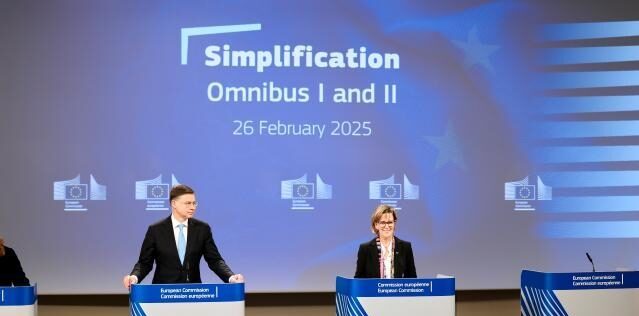The Progressive Post
A partnership based on diplomacy, not sanctions

Looking at our globe from above the North Pole, we are shocked at how tiny our Europe is. Russia, however, our Eastern neighbour, seems to be a giant. And indeed, Russia’s territory and military capacities are gigantic by European measures. On the other hand, the population of the EU is more than three times bigger than Russia’s. The nominal GDP of Russia is smaller than the German, the French, and even the Italian GDP. This fact leads to at least two conclusions: In the worst scenario, Russia can be a threat to us, so we should maintain the military alliance with the US. However, in every other area of cooperation, we should not be afraid to uphold a partnership with Russia. Its economy cannot threaten ours, and its relatively small population is well educated. We need Russia’s raw materials and the flight routes over her vast territory. Not to mention our shared cultural heritage.
By a dangerous legend, Russia is isolated and should beg us to be accepted as a second-rate partner. Yes, Brussels suspended the EU-Russia strategic partnership, and the US-Russia relationship is in even worse shape. But the world is changing, and new emerging powers are keen to cooperate with Russia. The threat of a would-be Sino-Russian military alliance is well known for almost everybody. Recognising this danger, India, once ‘the World’s largest democracy’, courts Russia to have a limited military cooperation and buys the Russian S-400 air defence system despite US protests. Turkey, and even Israel, have improved their connections with Moscow, not to mention many other developing countries. Political stability itself is a value, and President Vladimir Putin’s Russia is a stable partner in the eyes of the non-Western world.
Russian people need a more democratic system. However, living standards and life expectancy have improved during the Putin decades, and the majority of the people still support their President. The largest opposition party of the State Duma, the Communist Party, openly criticises the corruption, but it is even less pro-Western than the Kremlin itself. The Russian Federation consists of 22 republics and 63 ‘federal subjects’ with almost a hundred official or semi-official languages. ‘Domestic politics’ mean mostly local problems and successes for many people far from the capital.
In principle, the EU sanctions aim to help the democratisation in Russia, but in practice, they lead to suspicion, mistrust and a decrease of democratic rights in Russia. Every further sanction means further closures of independent NGOs, media, Western cultural institutions, and private initiatives in Russia.
I grew up in Communist Hungary. We were the real victim of the Cold War, and the détente made our life easier, step by step. It opened the doors to the West, and it created first smaller and then bigger areas of freedom. Freedom starts with opening and not closing the doors.
Sadly enough, fewer Russians are as Europe-minded as we imagine. The Friedrich Ebert Stiftung (FES) released a shocking Youth Study on Russia in 2020. “Only 20 per cent of respondents (from 14 to 29 years old) consider their identity to have been shaped by what they perceive as Western culture, only 20 per cent identify themselves as Europeans, and only 36 per cent consider Russia a European country”, says the report. The research shows a growing dissociation of the Russian youth from Western Europe. It doesn’t mean that they admire their own political system. For instance, the level of complete distrust towards NATO (36 per cent) is only 10 per cent higher than the distrust towards the Russian political parties (26 per cent). The return of Crimea to Ukraine would be unacceptable for two-thirds of the young Russians, even if sanctions were lifted.
It is an illusion to think of a pro-Western bend of Russian politics after the departure of President Putin– whenever that happens. If we want to make a deal with Russia, we should act before it’s too late.
‘Chto delat‘, what is to be done then? As the old wisdom says, let’s stand on two feet. We should maintain our military cooperation with the USA, the UK, and Canada inside NATO on the Western side. On the Eastern side, we should build a partnership with Russia on economic issues and a comprehensive development of Northern Eurasia. Or, as Emmanuel Macron used to call it, to develop ‘Europe between Lisbon and Vladivostok’. Both the European Union and Russia have to face the challenge of the Chinese economy, mass migration, climate change, jihad and other dangerous trends. These challenges call for a practical cooperation with Russia.
Building a partnership needs not sanctions but good diplomacy and a common set of interests. The US and UK are allies, but they don’t share the continental Europe as we do. So, the EU27 should have its own Russia-policy, based on our interests and values. We should not put our military alliance with the US and the UK in danger, but we do not need to serve their economic interests either. Russia has everything (raw materials, freshwater, food, Arctic harbours, and metals due to the melting ice, nuclear weapons etc) except enough population and a stable partner power. A new Northern Eurasia project would serve to mutual benefit.
Besides having a vision, we should take practical steps as well. We should understand what’s really going on in Russia. As the FES report shows, the reality is somewhat different from the Western media’s view on Russian public opinion. We should try to initiate a dialogue with Europe-minded Russians even if they don’t want to overthrow Putin. The Russian Social Democratic Party (‘A Just Russia — For Truth’) has been a full member of the Socialist International since 2012. PES could at least consider a dialogue with them. The Communist Party of the Russian Federation, the biggest oppositional party in the Duma, also has a Social Democratic internal faction which could be contacted by the PES. Partnership starts with mutual understanding, respect, and dialogue.
The last crisis over Ukraine is rather worrying. The best would be if the Ukrainian people could decide on their future. Some think that the mutually guaranteed neutrality of Ukraina and the autonomous status of Donbas inside its borders would be the best solution. I cannot judge on this. However, the whole crisis shows us how important it is to save the unity of the EU and NATO. It’s hard to say who wins or loses more, President Joe Biden or Putin with the crisis. But the real loser is Europe, and the absolute winner is China. The West is heavy-laden with the Ukrainian crisis, and Russia is more dependent on Beijing’s favours than before.
A military alliance of Russia and China would be the worst scenario for the West. Neither Russia nor China are really interested in it, and they would prefer to be accepted as respected partners on the world stage. But the permanent misunderstandings, lack of honest talks and a ‘war-thirsty’ propaganda can push Moscow and Beijing to consider the West as a ‘common enemy’. It is still avoidable but not with the present Cold War attitudes. The last weeks showed us that the war is not as unimaginable as we thought it was. We should do more for a peaceful Europe, as it is our common continent with Russia
Photo credits: Shutterstock
Related articles:
European Janus facing Russian brinkmanship, by Tomáš Petříček




